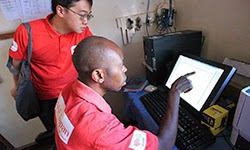Encouraging HIV-positive patients to continue medication
HIV/AIDS is generally understood to be a fatal disease. However, nowadays, by taking medication on a daily basis, patients can curb the onset and the development of AIDS, even if they are infected with HIV. Since 2000, AAR Japan has been implementing projects to raise awareness for HIV prevention, and has been carrying out a project supporting the education of children orphaned by AIDS in Zambia. In Zambia (located in Southern Africa), one out of every eight adults is said to be HIV-positive. Since January 2013, AAR has also been improving treatment facilities for HIV-positive patients in local clinics, and has been training local volunteers to support people living with HIV.Medication can save lives
AIDS is one of the most common causes of death in Zambia. Since most of the victims are of prime working age, the disease has seriously affected the country’s economy and society. In collaboration with local and international NGOs, Zambian government has been making efforts toward HIV prevention and distribution of antiretroviral (ARV) drugs that stop the progression of AIDS. ARV drugs, however, must be taken at a designated time on a daily basis. If a patient forgets to take them, or stops taking them, the HIV in the body becomes resistant to the ARV drugs, and the medication becomes ineffective. As a result, the patient has to try a different kind of ARV drug. The types of ARV drugs available in the country are limited, so not taking the medication could have fatal consequences.
 |
| Mount Makulu Clinic staff and Tomomi AWAMURA, a staff member of the AAR Zambia Office, stand in front of a newly constructed treatment center for HIV-positive patients in the clinic. (July 1st, 2014) |
Nevertheless, since there is still a deep-rooted stigma toward HIV/AIDS in the country, some people feel too embarrassed to go to a clinic. Consequently, they are unable to get proper medication, so their condition worsens, and some eventually die. Additionally, some people stop taking the medication because they feel better shortly after taking it; they believe they are fine and mistakenly think they do not need it anymore. It is, therefore, proving difficult to encourage the local people to continue taking their medication.
Building specialized medical facilities in clinics
In January 2013, AAR built specialized medical facilities for HIV-positive patients in three clinics throughout Lusaka Province. In these clinics, patients can receive ARV drugs in an environment that protects their privacy. In addition, AAR has reorganized medical records of HIV-positive patients in each clinic, so that clinic staff can easily see when the patient last visited the clinic and when they should come again. AAR has also been working on making an electronic database of all HIV-positive patients in each clinic.
 |
| A local staff member and Yuki SAKURAI (left), of theAAR Zambia Office, prepare to make a database of HIV-positive patients registered at Mount Makulu Clinic. (May 30th, 2014) |
“I don’t want to lose any more loved ones to AIDS”
AAR has also trained 47 volunteers whose task is to visit the patients who missed their clinic appointment, and counsel them on starting to take their medication again. By the end of July 2014, the volunteers made 1,300 home visits. At one point, these volunteers discovered a patient in critical condition, and were able to save the patient’s life by immediately sending him to a hospital.
Albert MBUNJI (age 42) has been volunteering since February 2013. He said, “I lost my parents and three siblings to AIDS. I became a volunteer because I wanted to do something to help eradicate HIV. Since learning specific counseling techniques from AAR, I have been able to confidently deal with patients. There are some HIV-positive people who, because of the strong stigma, lose hope and their self-esteem, and in their despair they eventually stop taking their medication. Thanks to our actions, when these people decide to continue their medication and are able to live their lives with hope, I honestly feel overjoyed that I’m making a difference.”
 |
| Albert MBUNJI is a volunteer who supports HIV-positive patients. |
As of now, the volunteers hold a meeting every week, sharing their experiences from home visits and learning about more effective ways of counseling.
AAR started a project to build a library where AIDS orphans can study and develop friendships with other children in the same situation. Your generous support would be greatly appreciated.


